Football in the Year of Two Thanksgivings
Football and Thanksgiving have been linked since Harvard and Yale played on Thanksgiving in 1876. A few years later, the Intercollegiate Football Association decided that the top two teams each year would play one another in New York on Thanksgiving of the following year. That game soon became a major social event, attracting large crowds and setting the stage for future high school and college rivalry games on Thanksgiving Day.
Until the 1960s, college teams played nine or ten games per season, opening in late September and ending before or on Thanksgiving, with a few exceptions. For decades, the Big Ten had a rule requiring teams to finish their seasons before Thanksgiving and did not allow participation in bowl games.
The pages below are from a gas station premium, the 1939 Atlantic Refining Football Book. Atlantic was an Eastern brand, so the schedule listed Eastern radio broadcasts.
In the 1930s, most teams created their schedule one year at a time, often announcing a preliminary schedule in December or January and filling it out early the following year. The preliminary schedules often distinguished "open" dates, on which they hoped to schedule games, and "permanently open" dates, which they blocked for one reason or another. Many teams' preliminary schedules for 1939 showed November 25 as "permanently open." This kept open the Saturday before Thanksgiving, which they expected to fall on November 30, 1939.
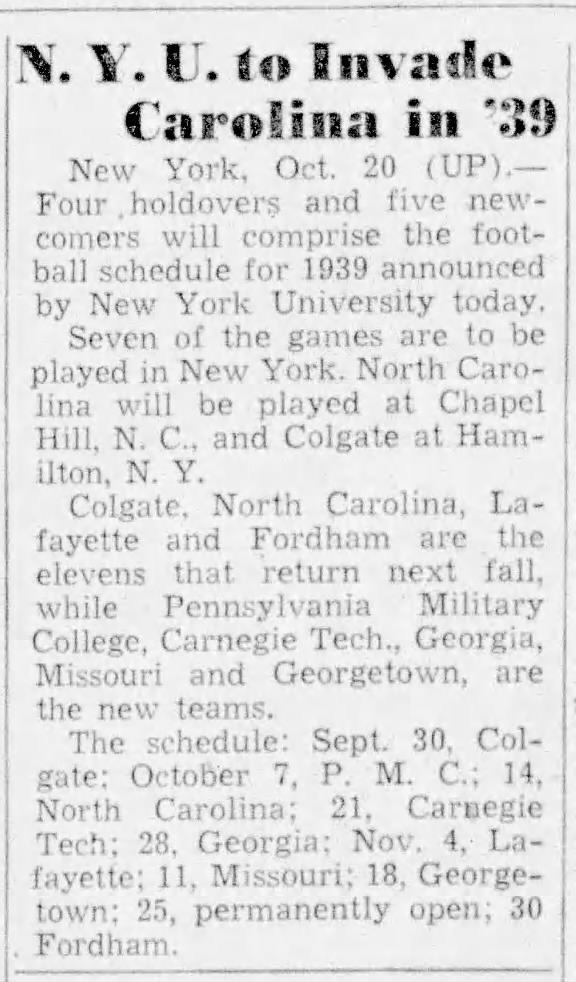
Nowadays, we celebrate Thanksgiving on the fourth Thursday in November. However, the first standard date for Thanksgiving was the last Thursday of November because that was when Abe Lincoln’s family celebrated it. The last Saturday became the norm, but it was never official until the President proclaimed it each year, and each governor followed suit. Of course, a President could always change things up, but they never had.
However, in the depths of the Depression, business interests lobbied FDR in 1933 to shift Thanksgiving from the traditional November 30th to the 23rd to extend the Christmas shopping season. FDR refused in 1933 but agreed to the change when the traditional Thanksgiving fell on the 30th in 1939. Unfortunately, he waited until August 14 to announce that Thanksgiving would fall on November 23 rather than November 30.
Of course, the late announcement and petty party political disagreements sent folks into a tizzy, leading to complications. The District of Columbia and 23 states recognized the new date, 22 states did not, while Colorado, Mississippi, and Texas recognized both Thanksgivings.
Families, schools, workplaces, government offices, and banks suddenly had to shift holiday plans, or not. Paper calendars for 1940, printed before the holiday season for business and personal gift-giving, were suddenly outdated, assuming Thanksgiving came early the following year. And, of course, most troubling of all was the impact on football schedules. For example, the Big Game between Cal and Stanford scheduled for November 25, the Saturday before the traditional Thanksgiving, now fell the Saturday after the early Thanksgiving. Would students stay on campus to attend the game or go home to celebrate early Thanksgiving with their families? Should rivalry games scheduled on traditional Thanksgiving be moved ahead one week or left as planned on a Thursday that was no longer a holiday? And since states differed in their recognition of early and traditional Thanksgiving, what was to be done for rival teams from different states, one of which recognized early Turkey Day and the other traditional Thanksgiving?
Luckily, the teams that left the weekend before traditional Thanksgiving permanently open had the flexibility to rearrange things, but there were many solutions to this problem. Most teams left their season-ender on its scheduled date, especially those in states that retained the traditional Thanksgiving, but others made changes.
Some, like Washington-Oregon and Maryland-Syracuse, advanced their games two days, from Saturday (11/25) to early Thanksgiving (11/23).
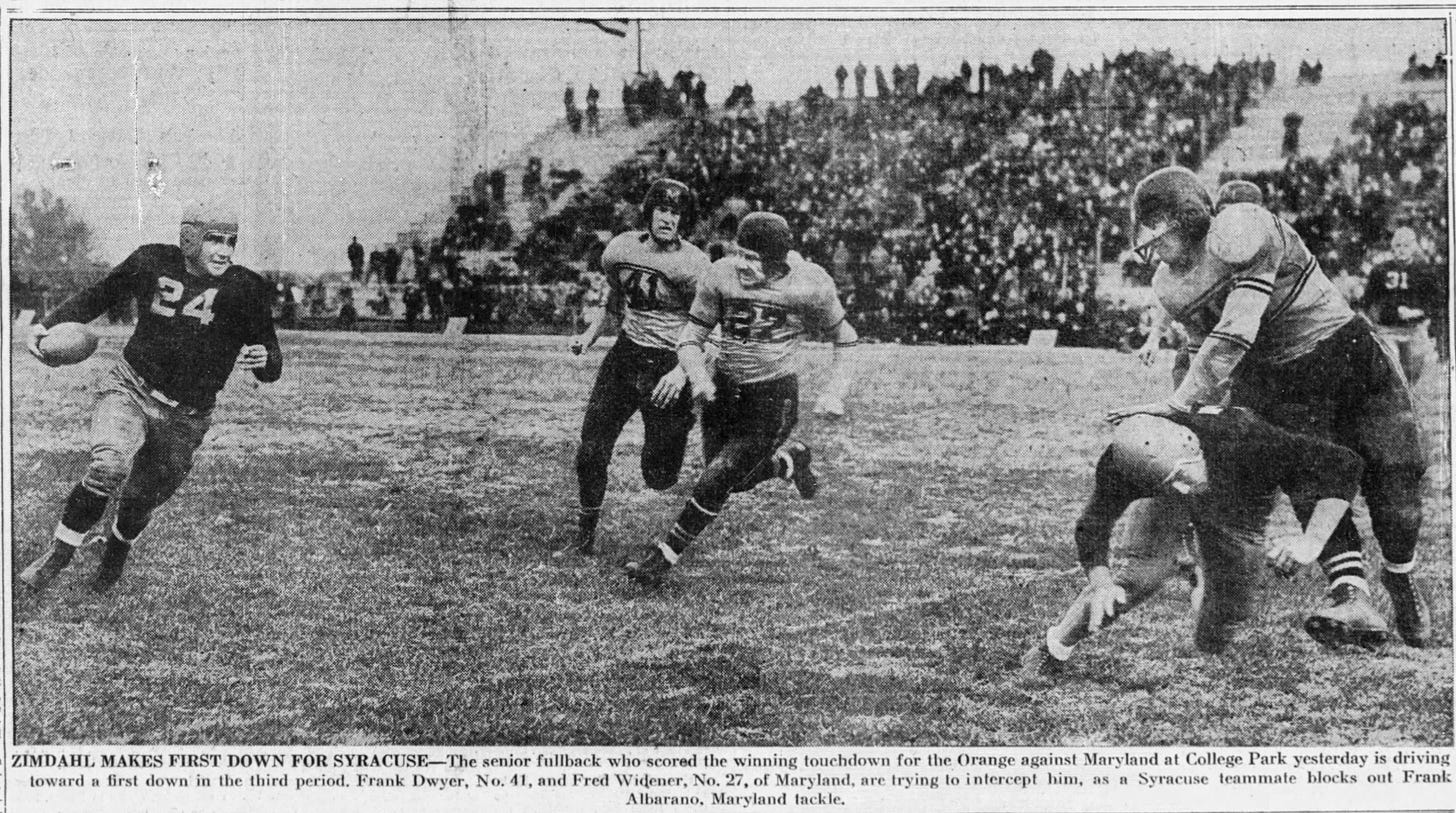
Others, such as Miami-Cincinnati, Richmond-William & Mary, and VMI-Virginia Tech moved the football clock ahead a full week, shifting from the traditional Thanksgiving (11/30) to early Thanksgiving (11/23).
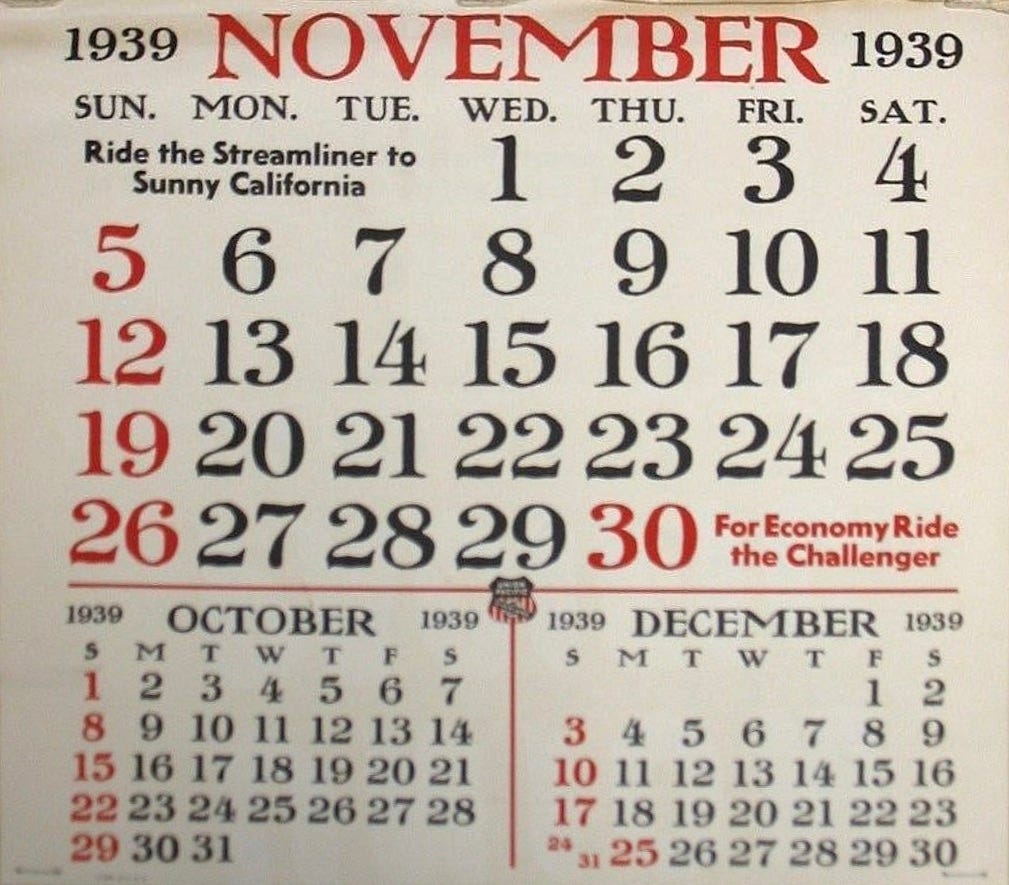
Missouri-Kansas switched from traditional Thanksgiving (11/30) to the previous Saturday (11/25). In contrast, other Show-Me Staters went the other direction, with the St. Louis-WashU game going from traditional Thanksgiving (11/30) to the Saturday (12/2) after it. Auburn-Florida went opposite Missouri-Kansas, moving from a Saturday game (11/25) to traditional Thanksgiving (11/30).
The State of Colorado opted to celebrate early Thanksgiving, yet the big Denver-Colorado rivalry game was slated for traditional Thanksgiving. Ultimately, they decided it was too much work to move up the game, so they left it as is. However, Denver moved its game with Idaho from Saturday (11/18) to early Thanksgiving (11/23), which meant that Denver played two Thanksgiving Day games in 1939.
Finally, the Maryland-Washington & Lee game scheduled for 11/30 or 12/2 (depending on your source) fell victim to the Maryland-Syracuse rescheduling mentioned earlier and was canceled.
Thankfully, FDR indicated in August 1939 that the federal government would recognize early Thanksgiving in 1940, and a joint declaration of Congress in 1941 established early Thanksgiving as the national standard. While our nation has fought many internal battles since then, the day on which Thanksgiving falls has not been one of them.
Despite Thanksgiving's schedule remaining steady since 1941, the football world has changed. The Thanksgiving rivalry games once popular at the high school level faded with the arrival of state championship playoffs, and the colleges shifted their games to the Friday and Saturday after Thanksgiving. Today, Thanksgiving football is tied in the public's mind to the NFL's Detroit Lions and Dallas Cowboys rather than to the matchups that first linked pigskin with turkey.
Of course, the Franksgiving controversy of 1939 and 1940 is now a distant memory for a few and is largely unknown to most.
I hope you enjoy your Thanksgiving with friends and family!
Football Archaeology is reader-supported. Click here to buy one of my books or otherwise support the site.


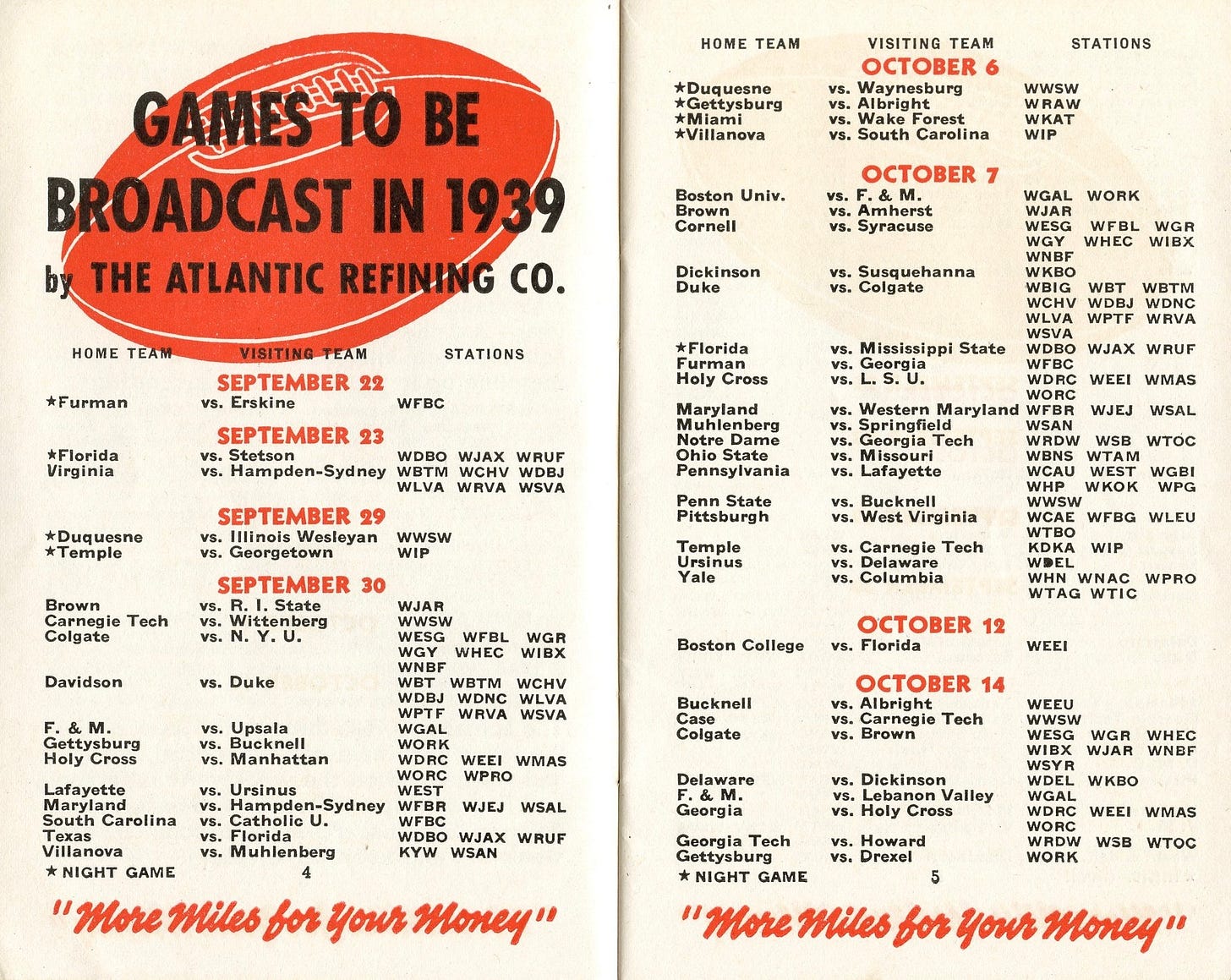

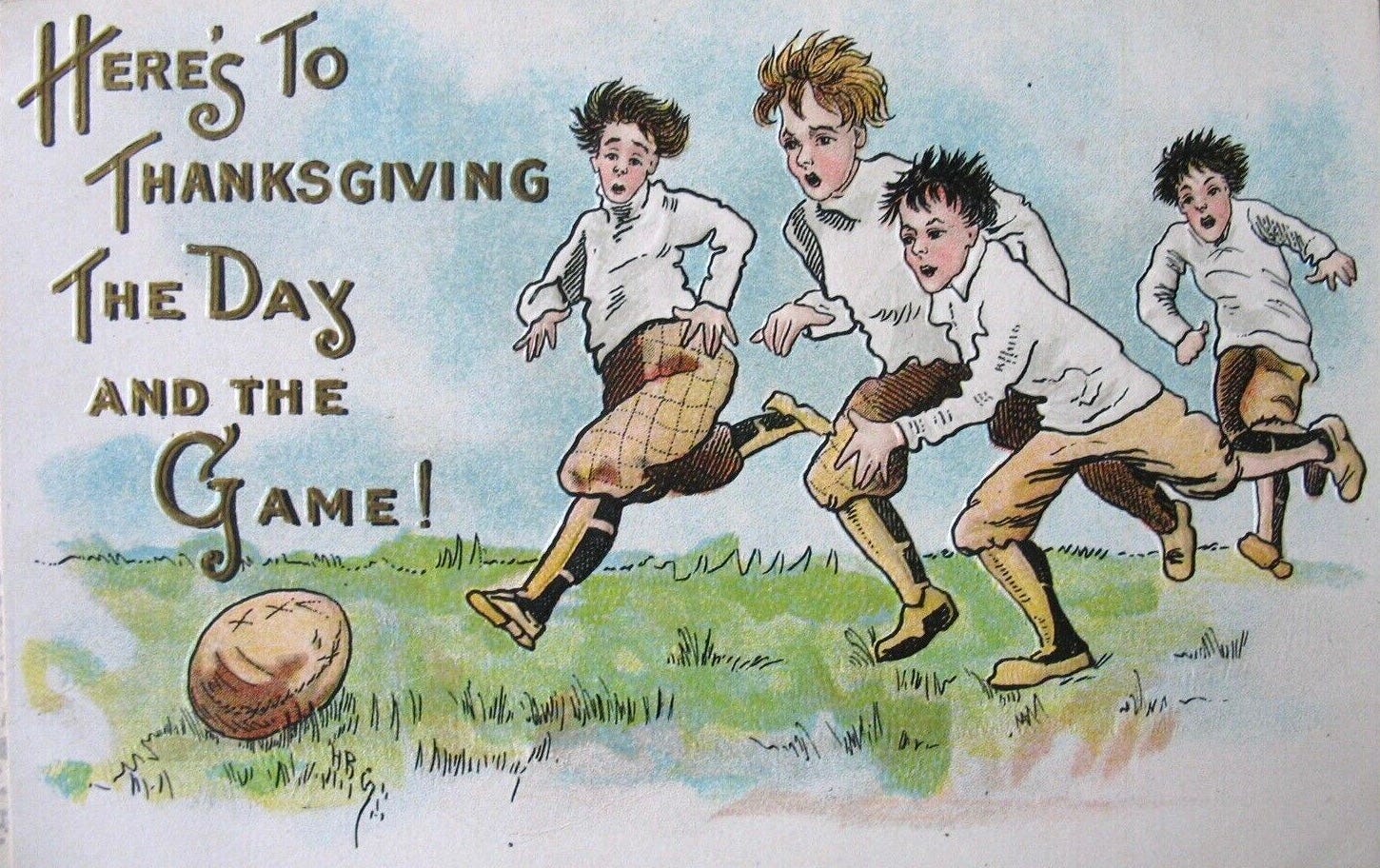
In 1980, Brown played intrastate rival URI on Thanksgiving Day. The Bears defeated the Rams 9-3.
The Ivy League finishes the Saturday before Thanksgiving. Very sane!